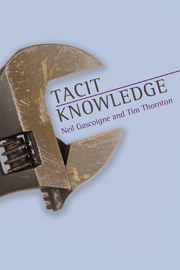3 - Wittgenstein's regress argument and personal knowledge
Summary
INTRODUCTION
In Chapter 1, we examined three historical resources for an account of tacit knowledge: the work of Polanyi, Ryle and Heidegger. We argued that through a shared opposition to a Cartesian approach to knowledge they also share an emphasis on the priority of both practical knowledge over theoretical knowledge and the importance of the person and the personal. All three also deploy a regress argument against a view of theoretical knowledge. Taken together, this suggested a clue for thinking about tacit knowledge. Tacit knowledge is practical knowledge or know-how. But this left the nature of what is known and the precise sense in which it is tacit undetermined.
In Chapter 2, we examined Ryle's regress argument and his account of know-how in more detail. We defended the regress argument against recent criticism by defenders of “intellectualism” But we conceded to them two important points. First, there is no general semantic marker for practical knowledge: practical knowledge-how has to be distinguished from theoretical knowledge-how in context. But that does not threaten the distinction. Second, practical knowledge has a conceptually structured content that can be articulated “from within”. To that extent, practical knowledge is more like theoretical knowledge or knowledge-that than might at first be thought. So if tacit knowledge is construed as practical knowledge there is, nevertheless, a content known. But unlike theoretical knowledge (and contra the new intellectualists view), there is, as Ryle asserts, a close connection between practical knowledge and ability.
- Type
- Chapter
- Information
- Tacit Knowledge , pp. 81 - 106Publisher: Acumen PublishingPrint publication year: 2013



